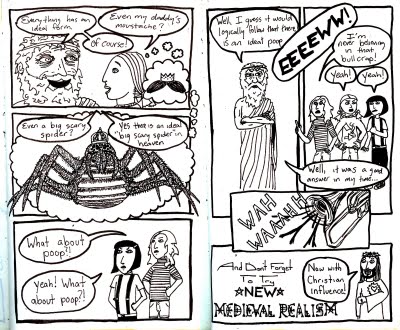Third-force psychology-Critique and interpretation
Third-force psychology reresents to me an interesting mix of useful change and hypocrisy. It’s usefulness comes in it’s challenge to the other schools of psychology in focusing in on the patient more (for example, psychiatry is trending towords more medication management and spends less and less time with patients). Third-force psychology brings a more humane focus to psychology, which is good. Yet, where it excels, it also fails. Because, I then feel that it goes to far in how much it focuses on humans, and alienates the other fields of psychology. Without using emprical data or any terms of labeling third-force psychology leaves itself in a rut. And because it rejects a lot of the testing other fields of psychology use, they pass up many chances for collaboration or cooperation.
And again, third-force psychology runs into a problem. It rejects labeling, yet it tells us that there is something wrong in the way we think that must be rejected or changed. Third-force criticizes other branches of psychology for “diagnosing” problems, yet it does the very same thing. I know that realistically, a lot of third force psychologists probably don’t hold this extreme view, yet it seems too big a flaw to overlook.
I also think third-force psychology fails in it’s inability to explain more than a small section of psychological problems. It definitely has is uses however. I really like Maslowe’s hiearchy of needs, which I believe has a lot of uses outside of psychology (mission work, business, rebuilding in disaster zones ect). And I enjoy the more holistic approach that third force psychology offers to mental health couselors.
I believe third force psychology has a lot to offer, but at the same time I find that a lot of what it does offer is too subjective and unscientific. Third-force psychology really is a product of the “post-modern” age. It embodies a lot of the humanistic philosophies (which I disagree with to an extent). Perhaps it’s a matter of opinion. But I believe that like Gestalt Psychology, third-force will eventually fade to the background as post-modernism begins to pass.



Ian Robertson on War of the mind
11:51 am, 11.22.10
I think it’s a big step to acknowledge that perhaps we humans are not as staunch in our convictions as we make ourselves out to be. When we hold to a faulty outlook of being unwavering in our principles, we set ourselves up to fall. I think it is powerful to know that how we think can be influenced by our situation, and knowing that may protect us from making decisions we may regret. I think a lot of people may not want to believe research like Zimbardo’s, but to do so would be a great step for humanity as a whole.
Ian Robertson on Subliminal Messages
11:44 am, 11.22.10
I thinnk that the pictures are great examples of subliminal messaging. It’s interesting to think about how we might be influenced to purchase items based on the “messages.” However, I think it’s important to note that the effects of subliminal messaging has a short term effect and doesn’t last long. However, I’m not sure if that fact will comfort anyone that is really worried about these sort of “messages.”
Ian Robertson on
11:05 pm, 11.18.10
I share your interest in Maslow and his focus on the psychology of those who are not actually “sick.” It seems like such a simple idea, to focus on the positive in a profession that primarily focuses only on psychological problems (clinical psychology is the largest subfield). His ideas and theories have so many uses and are very pragmatic. And I agree that perhaps we as a society do focus too much on the negative, which is why humanistic psychology is still popular. It offers an optimistic view of man in a world that so often negative in the way it views itself. And while humanism has perhaps too optimistic of an outlook, it acts as a good counterbalance to the rest of psychology’s pessimism.
Ian Robertson on So vintage.
11:00 pm, 11.18.10
That video was hilarious. I agree with you that the best quote is, “David, what are you doing with your sister in the basement?” I’m glad you found that video, I now have a much better understanding of what me id looks like, a man in red pajamas. Video aside, the topic of religion and the implications of id and superego are very interesting. I think one thing that can be said, Freud believed religion to be the extension of superego, especially Christianity. The whole “Father in the Sky” telling us what to do and correct us when we are wrong does not sound too dissimilar from the superego. I would like to hear what Freud would have to say in comparing the id and the devil. I’m sure he would say something about how the negative portrayal of the devil shows us how we as a society and as persons try to suppress the id.
Ian Robertson on Humanism vs. Behaviorism - Empiricism vs. Rationalism redux?
3:16 pm, 11.18.10
The trouble with trying to move beyond the Experience/Rational debate, is that in western thinking it seems to be the only two points of view of learning that we have. Perhaps we are just stuck on the two points or it could be that these are the two natural courses of learning and that when it comes to learning there is no alternative point of view. I tend to take a pragmatic outlook and say that in the real world humans learn in a way that is both rational and empirical. However, I remain skeptical as well in the fact that like all points of view, rationalism and empiricism have their fundamentalists which won’t accept any kind of ultimatum or middle ground. And as long as we have extremists on either side, the debate will continue.
Ian Robertson on Spoiler Alert!
2:05 pm, 10.25.10
I think the major problem with trying to raise unspoiled children is that in fact the parents themselves are spoiled. The hardest part with trying to change a parents style of children is telling them they are wrong, or that the problems that their children are having are their own problems. Its one thing to tell a parent that their is something they need to change about their child, but when you tell them they need to change something about themselves they get bent out of shape. Not to mention there are so many quacks out there telling people “pop psychology” ideas that sound logical on the surface but lack any evidence or results.
Ian Robertson on Who Cares
2:01 pm, 10.25.10
Another thing to consider will Little Albert, is that they were able to effectively reverse his fear. Not to mention the child had a lot of fears to begin with. Watson and Cover really didn’t do anything to harm Albert, and what they did induce they reversed and a lot of the fears he had before the experiment.
Ian Robertson on Structuralism and Me
2:00 pm, 10.25.10
I understand the want for psychology to not be looked down upon by other science. Thankfully, I have yet to encounter any other science major who has said anything derogatory about psychology as a science. I used to feel similar in wanting psychology to be able to explain everything in hard facts. But I’ve come to realize that psychology is still a work in progress. And despite the fact that psychology cannot give an explanation for everything, it has produced a lot of useful information.
Ian Robertson on I am not a Sadist.
2:00 pm, 10.04.10
Sometimes I find that I laugh out of embarrassment for a person. Other times I find that if someone gets hurt, and I have been hurt in such a similar way, that I’ll laugh out of thinking what happened to me. It’s really hard to determine when it’s okay to laugh in social situations sometimes, what some find funny others will not. And once or twice I have been in a situation when someone said something biased or hateful and laughed and we did nothing but stare at them trying to figure out why something so terrible could be funny.
Ian Robertson on I am afraid of Phineas Gage
1:55 pm, 10.04.10
It’s an interesting point that you bring up. But I think we also have to consider that the person we are is always changing. Five years ago, I would have been more conservative in my politics and theology, but I have become more liberal over the last few years. Five years ago, I wouldn’t have known that I want to be a psychologist or have the want to help people in that way, it is a definitive part of who I am now, I have changed. I am not the person I was, but I’m still the same person.
It’s cases like Phineas Gage that bring any religious thinker to some very hard questions. What if someone had been a Christian, had a lobotomy and was then an atheist? Are they saved? Can they be held accountable for the change? They are very hard questions and I’m not for sure if anyone is prepared or qualified to answer them.